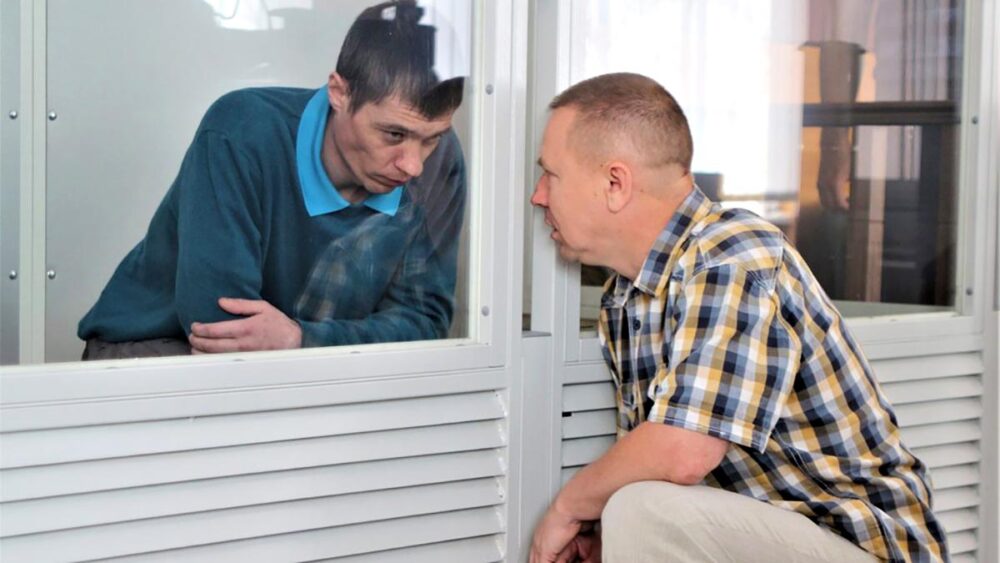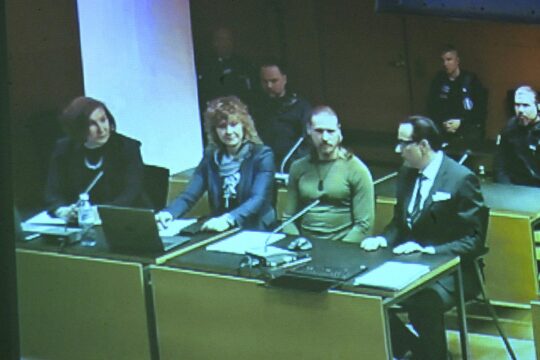On 26 February 2022, Russian tanker Mikhail Kulikov fired at a multi-storey building on Kiltseva Street in Chernihiv, northern Ukraine. The investigation revealed that Kulikov was given an order by Russian Major Leonid Shchotkin to turn the tank's turret towards the newly constructed building and make an aimed shot. Kulikov hit an apartment on the tenth floor. There were no people inside. The Ukrainian military took both tankers prisoner the same day. Shchotkin, an officer, was exchanged two weeks later. The Desnianskyi District Court of Chernihiv tried Kulikov from June to August 2022. He was sentenced to 10 years in prison. Ukrainian lawyer from Chernihiv Pavlo Kostiuchenko defended him.
Despite the high profile of this first in-person trial of a Russian soldier in the Chernihiv oblast, Kostiuchenko said that for him it was “an ordinary case,” no different from “drug dealers who spread drugs and also kill people”. He even said that he hardly remembers it. “There are a lot of cases. As for this man, I no longer remember him as a person, nor do I recall the details. I was appointed to defend him, and I did my job. I don't focus on one person. I completed the case and moved on.” Defending criminals “is a lawyer's job,” he said. “The law provides for a defence, so it doesn't matter whether it's a military or a civilian defendant. Why would you work at the Bar if you are going to refuse to defend someone? A lawyer cannot resign of his own accord. Only the client can revoke his consent. If not me, then another lawyer will defend.”
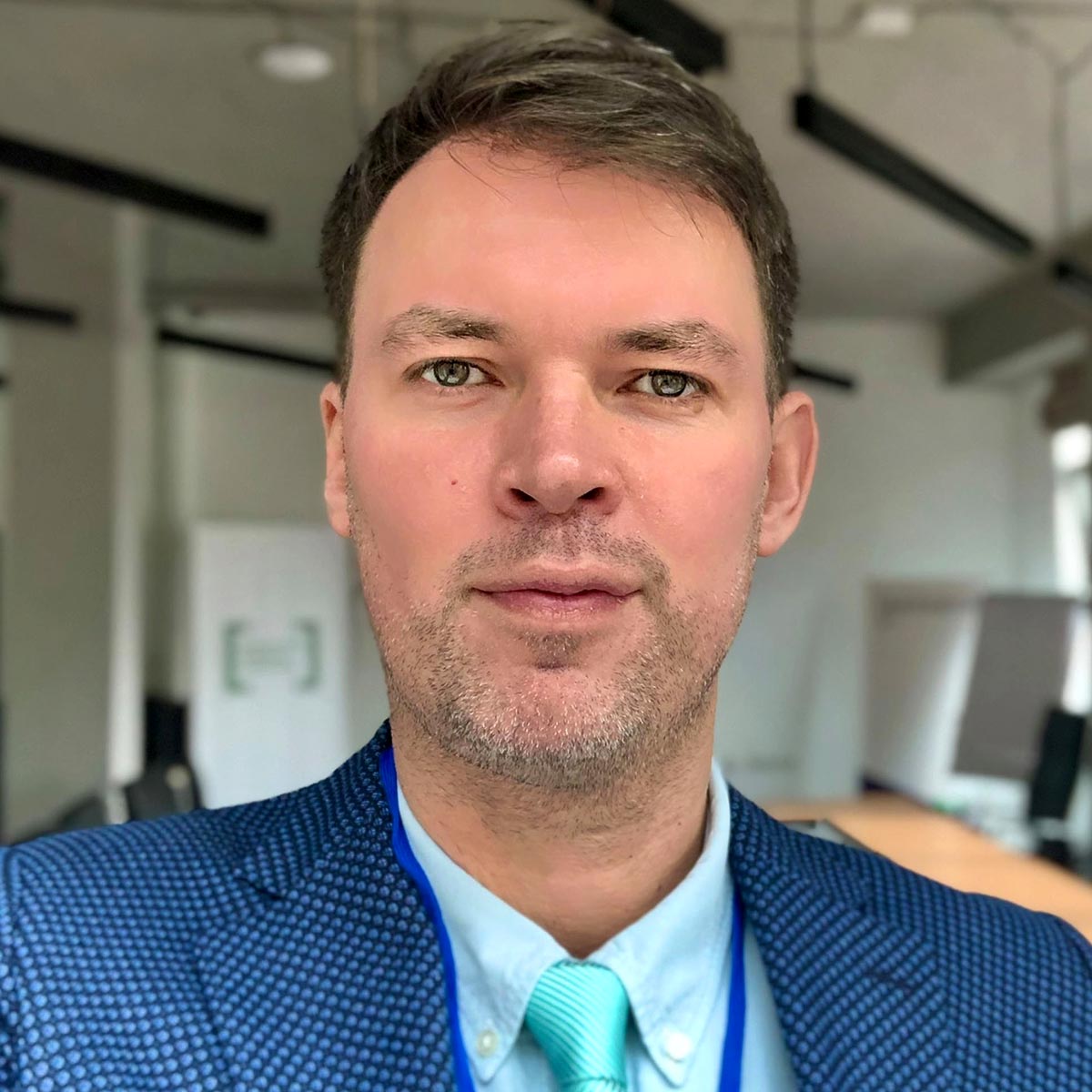
Ukraine is a rare example of a country that prosecutes war criminals during the active phase of the war. War crimes supects began to be massively tried in Ukrainian courts soon after Russia's full-scale invasion in February 2022. The Constitution of Ukraine prescribes that everyone has the right to a defence. Lawyers for accused Russian soldiers are appointed through Ukraine’s free legal aid (FLA) system. The register of lawyers who can provide free legal aid includes more than 9,000 specialists, but only 3,000 of them sign contracts with the FLA system every year. However, not all of them may take cases related to war crimes, explained Oleksandr Baranov, director of the Coordination Centre for Legal Aid Provision. Such cases are not tried across all regions of the country. And not all lawyers are willing to provide such a defence because of their opinions or the way they have been personally affected by the war. “This decision [to defend Russian servicemen] is taken by the lawyer on his own accord. There is no such clause in the lawyer's code about whether or not to defend. It's more about the fact that a lawyer can refuse an assignment if he or she realises that he or she will not be able to provide the [required] quality of service or is inexperienced in this type of cases. Some lawyers, when they sign contracts with us, simply indicate which kind of cases they will not take,” Baranov said.
“Traitors”
Then there is the stigma. Lawyers are often associated with suspects in Ukraine, notes Baranov. Because of this, they can be accused of being traitors defending war criminals. “People do not think that a lawyer assures his client's access to a fair trial, and that this is his professional duty,” he said. “There was a case when the interpreter told the lawyer directly to his face that he was a traitor because he was defending a Russian. As a result, the interpreter was replaced. In fact, this situation is not the first. Lawyers have been associated with clients for a long time. I know lawyers whose cars were burned down, and Grabovsky was killed because of his professional duties,” he continued, referring to Iouri Grabovsky, a Ukrainian lawyer who was murdered in March 2016 while defending a Russian citizen captured in Eastern Ukraine.
Most cases involving Russian soldiers in Ukraine are tried in absentia. According to the Prosecutor General's Office, since February 2022 and until 8 July 2025, 175,363 war crimes have been documented in Ukraine. And as of 1 July 2025, 679 indictments have been submitted to courts on war crimes charges. As of 8 July 2025, the Chernihiv oblast Prosecutor's Office has registered 438 war crimes cases, for which 47 verdicts were issued, including 44 in absentia. A total of 73 people have been convicted. “As for the Chernihiv region, we are not aware of any cases of threats or pressure, but this does not mean that they do not exist,” said Baranov.
Unlike in Kulikov's case, the lawyer in an absentia trial is not able to communicate with his/her client. It is for the lawyer alone to choose the strategy for handling the case. “We talk about a client whom you have never met, but you represent his interests and protect him. It can't be otherwise, whether you like it or not. Honestly, many people don't want to defend, but that's the job,” said Konstantin Sapon, another lawyer from Chernihiv.
“All soldiers and mid-level officers who are not part of the Russian Federation's highest command will never find themselves in special international institutions,” such as the International Criminal Court in The Hague, explained Yuriy Belousov, head of the Department for combating crimes committed in the context of armed conflict at the Prosecutor General's Office of Ukraine. “We have to handle it in the national system. 99.9% of all crimes will be tried in our national courts."
Why Ukraine needs in absentia trials
Sapon has had two war crimes cases involving Russian soldiers. One of them was against Fail Mansurovich Khustnutdinov, a native of the Russian Kemerovo region. He was stationed in the Chernihiv region, namely in the village of Andriivka, from 20 to 30 March 2022. “Along with other Russians, my client trespassed on the territory of Ecoenergy Ukraine LLC and stole property there. They looted computers, household electronics, etc. He was sentenced to 12 years in prison,” he recalled. “Prosecuting criminals in absentia is a new procedure for us. In fact, this procedure emerged after Yanukovych [president of Ukraine from 2010 to 2014] fled in 2014. Many countries still do not have this type of criminal prosecution. Many believe that this is nonsense. It should not exist. Others believe, to the contrary, that we have the relevant regulations already established.”
Both lawyers, prosecutors and judges express scepticism about trials in absentia. However, they all believe that Ukraine needs this process and that it fulfils a number of objectives. “Initially, this procedure was perceived in a negative context, because there may be risks” for the defense, said Belousov. “But in fact, it is possible to look at this procedure from a different angle. On the one hand, of course, the country should take all possible measures to ensure the right to a defence. On the other hand, I often quote one of our international experts who did a legislative assessment of the in absentia procedure. He said that the procedure allows the victim to be heard in court. In my opinion, the victim should not wait 20-30 years before his or her testimony is finally heard. Therefore, this is the main argument for us regarding the proceedings in absentia,” the prosecutor said.
According to prosecutor Kyrylo Pugachov, another argument in favour of trials in absentia is “a notion of restoring justice and material compensation”. “It's easier to get some compensation when you have a court verdict in hand,” he argued. According to Kulikov's case file, his tank shot at the newly constructed building caused material damage of over 900,000 hryvnia (about 18,500 euros at today’s rate). “In absentia procedure allows us to use or seize the property of these individuals if they have it in other jurisdictions,” explained Belousov.
How do Russians suspects know they are indicted?
One of the primary difficulties encountered by lawyers defending Russian soldiers is the notice of suspicion informing the accused that they are being prosecuted for a war crime in Ukraine. Ukraine has formally recognised that an announcement of proceedings being opened in the Uriadovyi Courier or on the Prosecutor General's Office website is considered “due notification on our part”. However, according to our interlocutors, it is unlikely that the Russian military visits such Ukrainian websites. Pugachov says that the Chernihiv Regional Prosecutor's Office attempts to notify Russian war crimes suspects by all means possible. These practices, he says, are not provided for in the criminal code, but prosecutors try to follow the European Court's case law. “If we know the mobile phone numbers, we send messages with draft notices of suspicion, translated into Russian, of course. If we know the email address, we send them emails. If we know the place of work, most often it's a military unit or some Russian Ministry of Defence institution, we send it to these institutions' official email addresses. We had a case when a person responded with just a question mark. What can it mean? Did he understand or not? At the very least, we found out that the person had read it. Different situations occur. The key point is to take all possible measures we can.”
A big issue with in absentia procedure is the possibility of re-examining a court decision, Belousov said. If a convicted person becomes physically in the hands of justice, he or she should have the right to a re-trial. Currently, Ukrainian justice system does not have a procedure for re-examining a court decision. However, Belousov said that the Prosecutor General's Office is working on this issue and is preparing “a large-scale draft law factoring in the European Court's practices”.
And then there is the issue of the execution of the sentence. “How can it be executed when the party is not in Ukraine? There are cases when a person is extradited. But Russia and Belarus will not hand us over anyone,” explained judge Mykola Kuziura, for whom the Kulikov trial was the first war crime case in 32 years of judicial practice. But the first thing that worries him is the impossibility for the parties to argue during the trial. “The lawyer is unlikely to be able to collect any evidence. He is entrusted with the right to collect evidence in favour of the defence but he only has the information that the prosecution has gathered. He has no opportunity to communicate with the suspect. He cannot provide his own evidence, because it is, in fact, difficult to obtain it under such circumstances. Therefore, when considering such cases in the absence of one party, the role of the lawyer, in my opinion, is outweighed.”
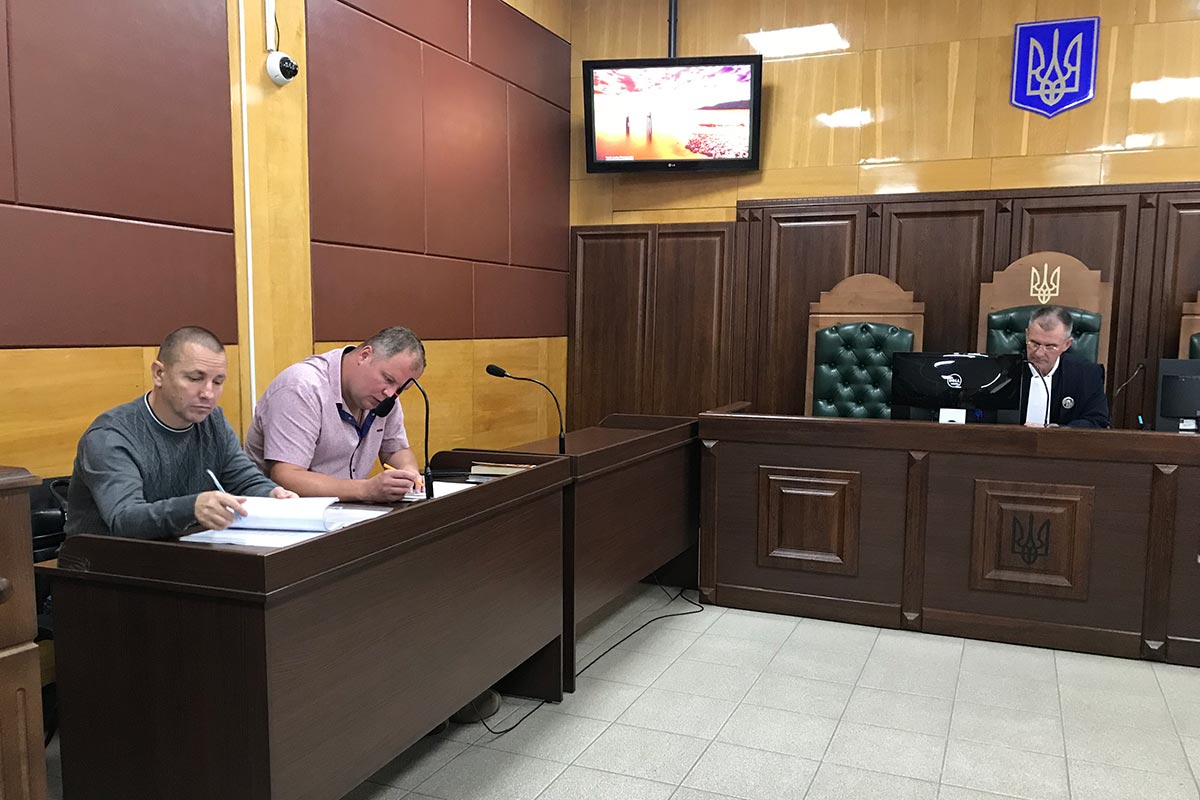
The judge’s memory of Kulikov
“The nature of the criminal offence itself, the duration of the investigation, and the sufficient evidence that can be gathered are important. For example, when the fighting was ongoing in Chernihiv, it was impossible to conduct an investigation. Because law enforcement agencies were evacuated. The investigation was only possible after the de-occupation. In the case of Kulikov, it was an obvious fact since he was detained at the scene. There was evidence, there were witnesses, and we were able to consider the case,” the judge said.
While Kulikov's lawyer says he “hardly remembers the case,” judge Kuziura does remember. “It was a tense trial. I had to prepare and know the rules of international law, as they were at the core of the indictment. However, in terms of procedure, this case did not cause me any difficulties, because it was conducted within the usual framework of criminal procedure law.” The judge recalled Kulikov behaving “quite confidently” in court, giving confessions, speaking “seemingly frankly”, sometimes “trying to minimise his responsibility”. “He apologised to the Ukrainian people. However, a main underlying theme was that he was a soldier, following orders from his commander. I specified in the verdict that only a lawful order must be executed, as explained by the Geneva Conventions. He knew what he was doing and where. He understood that they had entered the territory of another state, that they had been ordered to occupy the airfield. And that this is a form of aggression. Since Kulikov was an ordinary sergeant, I think he was simply hoping to be exchanged” like Major Shchotkin. “I didn't see any sincerity in him. He was just telling the whole truth because he understood that it was better to confess than to be proven guilty. That's why he tried to minimise his responsibility; he faked remorse.”
How much do defense lawyers make?
Defense lawyers faced another challenge – a financial one. On average, they earn 3,500 hryvnias (72 euros) for each phase of the legal assignment, according to Baranov. “This is the average payment in the system. The cost of work is affected by the severity of the crime, the number of accomplices, and the number of episodes. These are the things that increase the lawyer's working time. If it is one episode, the cost will be lower. If it is 10 episodes, i.e. more hearings, the cost will be different. This is how it works.”
As to whether it is possible to speak of a quality defence when lawyers receive such low pay, Baranov responded: “Back in the day, a lawyer could stretch a case for years and eventually receive 100,000-200,000 hryvnias (between 2,000 et 4,000 euros). Now there is a limit on the amount within a year, and it encourages lawyers not to delay the case. The system of free legal aid has never been able to provide a market-based level of payment. Because some lawyers charge 2,000 dollars for defending a client in criminal proceedings, others charge even more.”
Baranov explains that the FLA centre provides lawyers with training, networking opportunities and ongoing practice. “In our country, a lawyer does not wait for a client to contact him, he is constantly working. Some lawyers earn a million hryvnias (20,500 euros) or more per year. It all depends on how hard the lawyer wants to work. But for a lawyer to work on assignments efficiently, he or she cannot take more than 30 assignments per month, because he or she simply will not have enough time.”
Appealing is right
Chernihiv lawyers Sapon and Kostiuchenko confirmed having received payments from the state for defending Russian soldiers. Kostiuchenko referred to the single case of Kulikov. Sapon spoke about two cases. Both lawyers filed an appeal. “I always file an appeal,” said Sapon. “A lawyer does not only untangle the issue of guilt or innocence. There are many other things, including the extent of the punishment.” However, neither of them disclosed a specific amount per case. Instead, Kostiuchenko asked a rhetorical question: “Do you think the state pays a lot? Where can you be paid adequately in our country?”
“I once came across an analysis of war crimes trials in Kyiv courts,” judge Kuziura told me. “It stated that the lawyers were generally passive, sometimes simulating being active. I don't know the reasoning behind this. How should a defence lawyer behave in court when he or she has only the information from the criminal case file at his/her disposal? As for the practice in Chernihiv courts, I see that lawyers behave quite assertively. They challenge verdicts. They file appeals. And I think they are doing the right thing in these cases. In order to avoid any questions later, a court case must go through all instances. A person who does not appeal to the Court of Appeal can’t go to the Supreme Court. Therefore, I think this is the correct lawyers’ approach.”
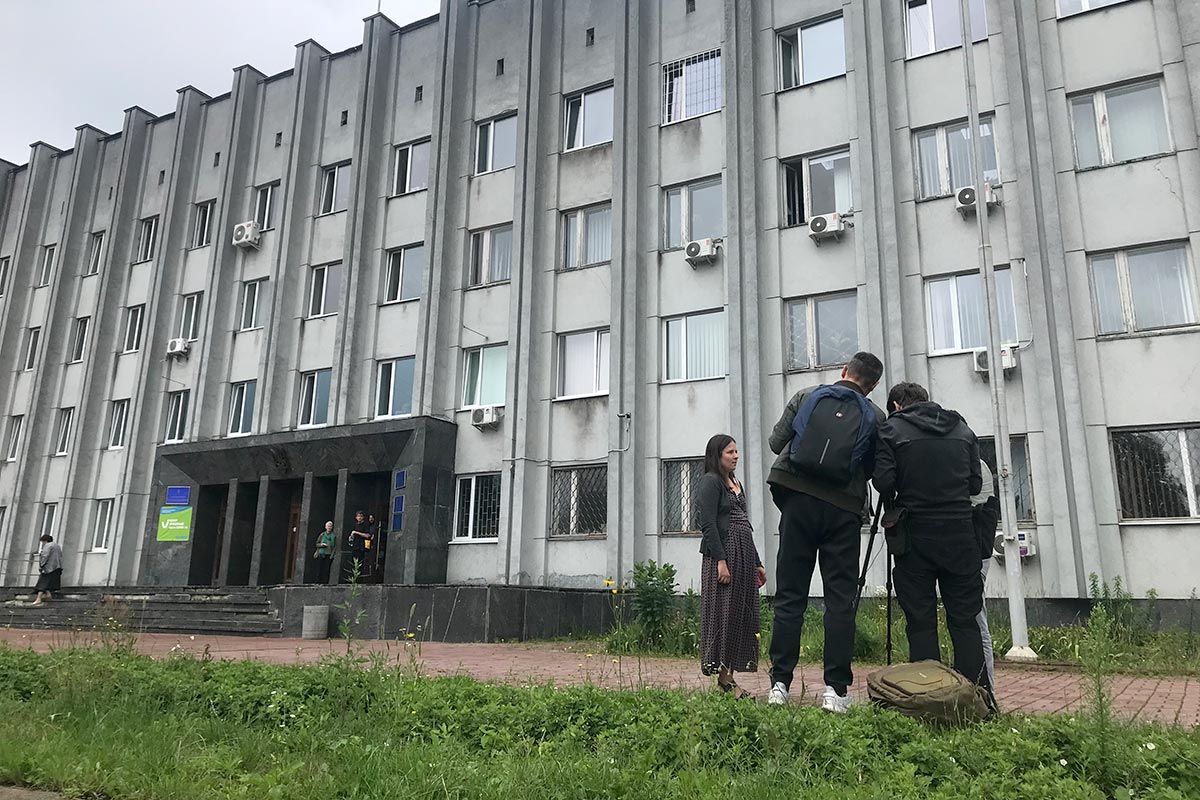
The Chernihiv Court of Appeal informed us that they do not have separate statistics on the number of cases filed by lawyers defending Russian military personnel suspected of war crimes. They keep general records, including those filed by the prosecutor's office. In total, from 2022 to 1 July 2025, 36 cases were appealed under Article 438 (war crimes). All decisions were upheld. In response to Suspilne's request, the Supreme Court replied that since the beginning of the full-scale invasion and until 17 June 2025, one cassation appeal for war crimes had been considered, and the decision of the previous court was upheld.
“Would I go and tell my wife about a murder or a rape?”
According to Sapon, the law clearly defines the grounds for a lawyer to be recused from a case: “Personal interests. A conflict of interest is certainly a ground for recusal. The fact that you don't like the client is not, nor is what he has done. That is, you can still arbitrarily say ‘I don't want to defend this Russian, so I won't’.”
Talking about his own safety while handling such cases, Sapon said: “First of all, I didn't have any communication with people who would associate me with the enemy. Secondly, this is not a topic you discuss while walking down the street or wearing a sign saying that you are defending a Russian soldier.” He also said that he does not tell his family about such cases. “You try to protect your family from certain information, because there are unpleasant things: murder, rape, and everything else. Would I go and tell my wife about a murder or a rape?”
The Bar Council of Chernihiv oblast responded that it “does not have information on the number of lawyers who refused to defend Russian military men suspected of war crimes, as it does not keep such records and does not have the authority to collect, analyse or disclose such information”. They also noted that “each lawyer is independent and autonomous in his/her activities”. Ukraine’s free legal aid system has issued 4,970 mandates to lawyers in criminal cases from 2022 to 23 May 2025. 56 mandates related to charges of war crimes. According to Pugachov, war crimes cases continue to be considered in the Chernihiv region, but the number of cases is not as high as in 2022. “We currently have eight indictments pending in court. It is, of course, more difficult to find evidence at this time. However, we keep trying. We document the shelling of civilian structures and the population. We are looking for shelling operators, gunners and their commanders who were handling a particular machinery or rocket launcher, for example.”
As of July 2025, Sapon was defending a second case against a Russian soldier suspected of torturing civilians in Lukashivka. Court hearings are held in the Chernihiv District Court. Kostiuchenko said that after the Kulikov case, he’s not had any cases involving war crimes defendants. As for Kulikov, he was sent back to Russia in June 2023 as part of a prisoner’s exchange.
This report was produced thanks to a grant by Fondation Hirondelle/Justice Info. A full version of this article was published on July 8, 2025, in "Suspilne".


